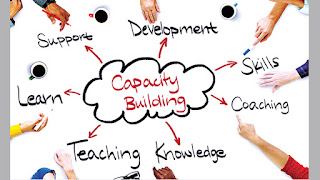More
often than not, when the psychological construct; stress is addressed, rarely does capacity building feature as an
antidote for the forever increasing stress levels in personal, professional,
corporate and community worlds of the 21st century. The more obvious
topics such as ‘identifying stressors,' 'dealing with stress, coping with stress,' 'overcoming stress,' 'indications that you are stressed …’ have taken center
stage. BUT, until the intrinsic underlying
mechanisms that support the development of stress, and its later psychosomatic
expression are understood, the possibility of dealing with this monster may remain a mirage that we never get to.
At
its basic description, STRESS is the
BODY’S way of RESPONDING to any kind of DEMAND or THREAT; real or imagined,
and the 21st century offers a great deal of such demands and
threats. According to the DISCREPANCY
THEORY, individuals utilise internalised ‘self-guides’ as standards to ‘judge’
themselves. That is, when faced by a demanding or threatening situation,
individuals evaluate the discrepancy between the demands or threats vis-a-vis their
perceived capacity to meet such demands. The greater the gap between the
demands and perceived capacity to mitigate them, the greater the emotional
discomfort the individual is likely to experience. Two scenarios arise from
this conceptualization; (i) When a
problem is perceived to be within an individual’s capabilities, then strategies
are put in place to deal with the problem, (ii)
When a challenge is perceived as beyond an individual’s capabilities, resulting is emotional and psychological turmoil. This second scenario results
in deployment emotional strategies to deal with
threatening situations, and stress may be inevitable when such strategies are not coupled with the appropriate thoughts and actions. Of importance to note
here is the word ‘perceived’…the
indication that such representation of self may not necessarily be quantifiable, but
rather a lack of believe in one’s capabilities, i.e. low self-efficacy beliefs (where self-efficacy refers to the optimistic self-belief in our
competence or abilities to successfully accomplish a task and produce
favourable results)
The idea is, don’t
wish for less challenging situations in life, rather, work to build your mental,
physical, social and financial capacity to meet the demands that will
definitely arise.
The
21st century realities need to be matched with requisite abilities
if current stress levels are to be mitigated. More important, in the wake of cut-throat
competition in personal, corporate and business worlds brought about by technological
advancement, individuals hoping not to be swallowed by the bottomless pit of
the 21st century stresses must increase their hard skills, as well as their
soft skills. We all must all go to the grindstone to hone our skills, and let SKILL MASTERY be our starting point, EXCELLENCE
be our modus operandi, then grace all
these with OPTIMISTIC SELF-BELIEF
in your competences and abilities to successfully accomplish a task and produce
favourable results
Building capacity in this manner ensures that the gap between daily demands and our abilities to meet them is forever narrowing, and stress levels go down with then!









